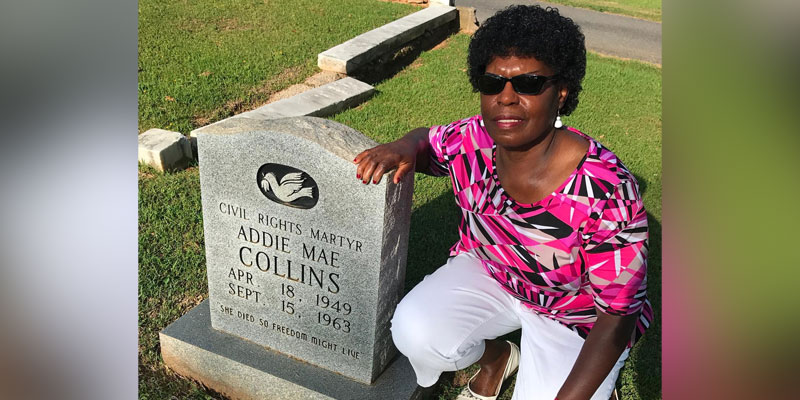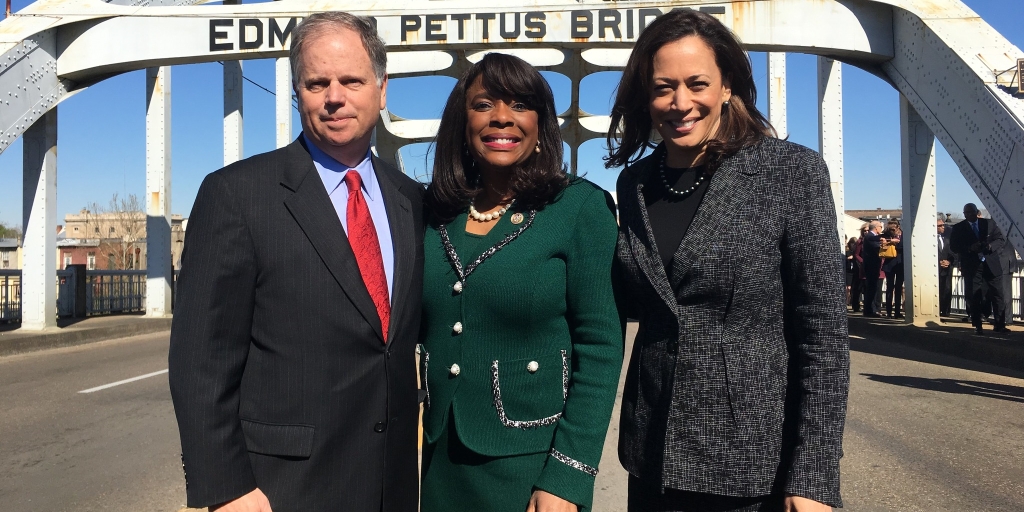This week marked 57 years since the infamous 16th Street Baptist Church bombing occurred in Birmingham, and the victims’ families are still feeling the effects of this dark day in Alabama’s history.
This includes Sarah Collins Rudolph, who herself survived the white supremacist, domestic terrorist attack. Her sister — Addie Mae Collins — along with Cynthia Wesley, Carole Robertson and Carol Denise McNair, died in the bombing. The victims were all black girls ranging in age from 11 to 14 years old.
Rudolph, who was 12 at the time, is now 69. As first reported by The Washington Post, Rudolph’s attorneys on Tuesday wrote a letter to Governor Kay Ivey seeking financial restitution and a formal apology from the State of Alabama.
The governor’s office confirmed to Yellowhammer News on Wednesday that they are in receipt of the letter and currently reviewing it.
The letter says in part, “Ms. Collins Rudolph simply wanted to do what so many other little girls across Alabama were doing — attend a church service. But instead of gaining the solace and celebration of prayer, the church was bombed by those affiliated with the Ku Klux Klan and our client lost her sister, her right eye, her childhood, and in ways she could never know then as a 12-year old girl, a lifetime’s worth of opportunities and dreams.”
George Wallace was governor of the state at the time of the bombing, and “Bull” Connor was police commissioner in Birmingham. The bombing came shortly after Connor’s police force infamously hosed down and unleashed dogs on protesters.
“While the State of Alabama did not place the bomb next to the church, its Governor and other leaders at the time played an undisputed role in encouraging its citizens to engage in racial violence,” the letter from Rudolph’s attorneys adds.
A member of Rudolph’s legal team cited the civil unrest that has occurred in America this year as a reason for optimism that the State of Alabama will do what she is requesting. Rudolph was permanently blinded in one eye by shards of glass from the September 15, 1963, bombing.
“More than ever, this is a time when there has been a national reckoning about the issue of racial justice,” said Ishan Bhabha, a partner at the law firm Jenner & Block. “The impetus for righting both current and historical wrongs has become more urgent, so that’s one thing. This is a major part of the national discussion now.”
The letter did not ask for a specific amount of monetary compensation, however it did reportedly include a sample draft of the type of apology Rudolph wants from the Alabama Legislature. Bhabha did comment on the matter of reparations.
“Given what Sarah has suffered — losing an eye … and more broadly the fundamentally different path that this horrendous act put her life on, how do you compensate for that?” the attorney said. “What is a lifetime of missed opportunities worth?”
Four members of the KKK were suspected to have committed the bombing, yet the road to justice was long — and potentially still incomplete.
Robert Chambliss was convicted in 1977 by then-Alabama Attorney General Bill Baxley, whose three-word response to KKK threats at the time is still legendary. Thomas Blanton Jr. was convicted in 2001 and Bobby Frank Cherry was convicted in 2002, both prosecuted by then-U.S. Attorney Doug Jones. All three convicted murderers have since died in prison. The fourth suspect, Herman Cash, died in 1994 before he could be charged.
The Washington Post article also reported that Rudolph’s attorneys in December met with Jones, now Alabama’s junior United States senator, to seek his advice.
In a statement to Yellowhammer News on Wednesday afternoon, Jones confirmed that the meeting took place. He did not directly address whether he supports the State of Alabama paying Rudolph restitution, however the senator did place blame at the feet of State of Alabama and City of Birmingham leaders from that time for the bombing.
“I did not feel it was my place to offer legal advice,” Jones said. “I did, however, confirm my belief based on my own research for the trials of two of the four Klansmen responsible for the bombing, that the State of Alabama, through George Wallace and others, and the city of Birmingham through Bull Connor and others, engaged in the kind of dog-whistle political rhetoric that promoted violence and led to the bombing.”
This came the day after Jones in a tweet honored the victims of the bombing on its anniversary.
57 years ago, four innocent little girls were killed by a bomb planted outside the 16th Street Baptist Church in Birmingham. Today, we can honor the memories of Addie Mae, Carol, Cynthia & Denise by uniting against the forces stoking the flames of hatred & division. pic.twitter.com/sH1QfjeFMI
— Senator Doug Jones (@SenDougJones) September 15, 2020
It should be noted that Wallace died in 1998, and Connor died in 1973.
By the day after the bombing in 1963, the City of Birmingham had offered a $52,000 reward for the arrest of the bombers, while Wallace had offered another $5,000. Back then, those amounts would have been worth more than eight times what they are worth now.
In a statement added to the Washington Post article on Wednesday afternoon, Rudolph herself went on the record.
“That day changed the course of my life forever,” she remarked. “It is hard to put into words the pain I’ve had to deal with, both physical and emotional, because of the acts of violent hatred and bigotry on that day. They wanted to hurt me or kill me because I’m black. They bombed a church because it was a black church. They murdered my sister and her friends because they were black. It has taken decades to even begin to come to terms with this trauma. To have my suffering acknowledged and to receive an apology for what happened to me would help bring a sense of closure. I truly hope Governor Ivey will do the right thing.”
Sean Ross is the editor of Yellowhammer News. You can follow him on Twitter @sean_yhn













